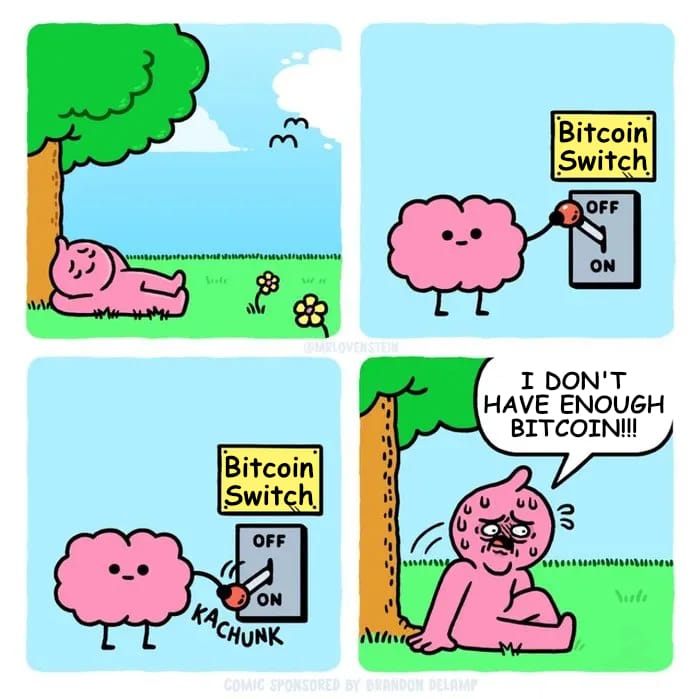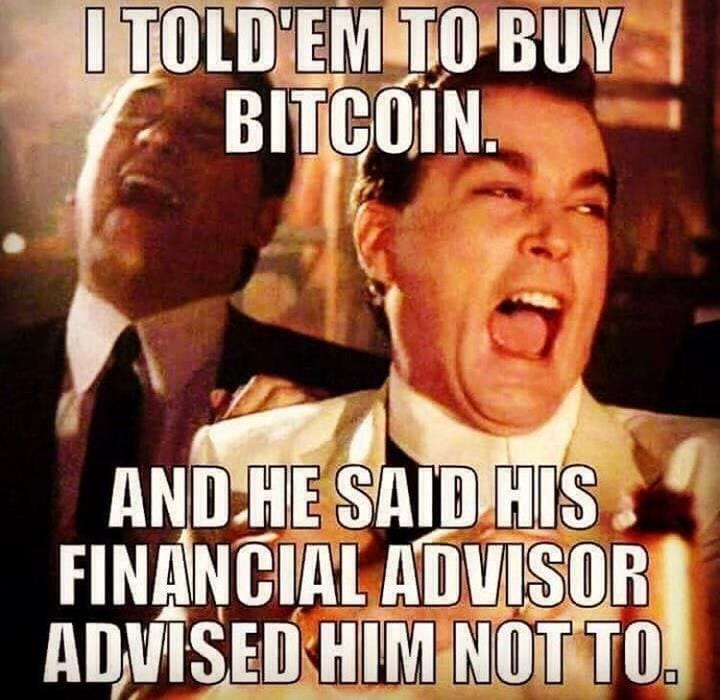
Greetings {{ name | Earthling }},
Welcome to issue #28 of the Bitcoin Breakdown, where you find all the important Bitcoin content in one place.
First time reading? Sign up here.
Interested in sponsoring the newsletter and reaching thousands of burgeoning and dedicated bitcoiners alike? Please click here.
Any feedback via the poll near the end of the newsletter is much appreciated. Happy reading! 👽️

📰 HEADLINES
Binance’s token, BNB, sinks to its weakest level since late June 2022, as speculation is rife that the company has been attempting to maintain the price of BNB by selling BTC reserves to purchase more of the token, in order to prevent a margin call on a substantial loan collateralized by BNB. The sell-off possibly contributed to the largest single day drop of the year last week that sent BTC prices below $25K. ODELL has however dispelled rumors that Binance is to blame for the dip, with chain data showing that the exchange’s BTC wallets are near all time highs. Glassnode also notes that the primary driver for the drop appears to have been a leverage flush-out in derivatives market, seeing over $2.5B worth of open interest cleared in just a few hours.
Oman unveils new $350M Bitcoin mining facility in the Salalah Free Zone, a special economic zone with low corporate taxes. The country’s Ministry of Transport, Communications, and Information Technology initiated the project, aiming to establish Oman as a leading global mining hub. Overseen by Exahertz International, the facility will run in cooperation with Dubai-headquartered blockchain company Moonwalk Systems and is expected to create new jobs and make significant strides in the local economy. The center will use the latest hardware from Bitmain Technologies, with plans to set up 15,000 machines by October 2023. Currently, it operates in a pilot regime with 2,000 machines online, working from 11 megawatts of consumed power.
Solo Bitcoin miner cracks a block without any massive computational power, earning 6.25 BTC in the process. The miner, registered with Solo CKpool mining service, had around 1 PH/s hash power, achieving a significant accomplishment considering the dominance of major mining pools. The miner likely used ten Antminer S17 machines to achieve this.

QUOTE OF THE WEEK
A drug dealer has no incentive to help their customers get clean. A government has no incentive to help citizens become sovereign.

Unlock the Power of Your Stack
Access instant credit without selling your stack with Arch, a revolutionary new platform that empowers investors to obtain a single loan collateralized by multiple holdings, all securely held by the leading qualified custodian, BitGo.
Arch adheres to strict regulatory frameworks and never touches customer funds, so you can trust that your stack is safe and secure.
Take your holdings to the next level.

🏆 TOP STORIES
‘Bitcoin ≠ Crypto’: Veblen Branding in Practice (Aug 24 | 2 min read)
Stacker News user @mallardshead discusses the concept of ‘Veblen brands’ (goods for which the demand increases as their prices increase) in the context of the slogan ‘Bitcoin, Not Crypto’. The term ‘crypto’ is colloquially used as a plural word that implies parity among various cryptocurrencies, but Bitcoin differentiates itself through Veblen branding, emphasizing its exclusivity and uniqueness, as it is after all the only ‘crypto’ that is truly decentralized. This branding strategy sets Bitcoin apart from other projects that (unsuccessfully) compete using utility arguments, which @mallardshead argues is ineffective against a Veblen brand to begin with. In the end, Bitcoin of course represents more than just a Veblen good, serving as a store of value, a payment network, and first layer protocol enabling virtually limitless potential, with the powerful motto ‘Bitcoin ≠ crypto’ underscoring its distinctiveness.
Big Brother, the Digital Dollar and Ingemar Ståhl’s Prophetic 1979 Essay (Aug 22 | 3 min read)
Daniel B. Klein (professor of economics at George Mason University’s Mercatus Center) writes for the WSJ how the 1979 satirical essay by Ingemar Ståhl predicted the dangers of social credit and ‘debanking’. The essay proposed tracking all transactions in the economy, eliminating cash, and justifying it as a means to address social justice and equity. Klein argues that today central bank digital currencies (CBDCs) could be used to exert control and ‘debank’ individuals, referencing examples like China's social-credit system and instances of bank account cancellations for dissenting voices. Klein proposes that CBDCs, like other despotic innovations, are a solution in search of a problem, echoing concerns about government overreach and loss of financial privacy.
The ‘Inflation is Good’ Myth: How the Fed Sells Poison (Aug 19 | 4 min read)
Peter St Onge, Mises Institute Fellow and former MBA professor, discusses the concept of inflation and its impact on the economy, particularly in the context of central banks and their role. He challenges the mainstream notion that inflation is necessary and highlights the benefits of deflation, specifically the ‘good kind’ of deflation where an increase in economic output outpaces the growth of money supply. St Onge argues that historical ‘Golden Ages’ were characterized by deflation and contends that central banks create the ‘bad kind’ of deflation through artificial pumping of cheap money and then use it to justify their actions. Transitioning to a hard money system like Bitcoin is proposed as a solution, which would result in controlled deflation, reduced economic volatility, and a smaller government.
How the Bitcoin Revolution Resembles the Protestant Reformation (Aug 18 | 10 min read)
Satoshi Nakamoto is often compared to Johannes Gutenberg because they both invented technologies that empower the masses against central authority through the scaling of information dissemination. Ulric Pattillo however proposes a more accurate comparison to Nakamoto would actually be Martin Luther. Both provided a spark to the latent energy in groups of people that grew tired of the wholesale theft that defined the systems of their respective times: Luther's posting of the ‘95 Theses’ marked a rebellion against the Roman Catholic Church's power and manipulation of religious practices, while Bitcoin challenges traditional financial systems and central banks. The importance of individual freedom in both religious beliefs and financial choices is emphasized, comparing the Protestant Reformation's separation of church and state with the need for a separation of money and state. Bitcoin's decentralized nature is also likened to the Reformation's shift from centralized religious authority to localized church governance, allowing individuals to have ‘skin in the game.’
Less is More for Driving Bitcoin Adoption: Come for the Curiosity, Stay for the Revolution (Aug 22 | 4 min read)
Dave Birnbaum, product director at Coinbits, looks at how to effectively spark interest in something that's quite technical to a non-technical person. Bitcoin adoption can be driven by focusing on the minimum viable knowledge framework, which teaches people about the core benefits of Bitcoin without overwhelming them with technical details. Long-term adoption will also be more sustainable if individuals understand the importance of Bitcoin, not just its convenience. All-in-all, the focus should be on core concepts and hands-on experience, gradually guiding newcomers to understand the empowering potential of Bitcoin, leading to excitement and sustainable adoption.
This Revolution is Not a Class Struggle (Aug 12 | 4 min read)
Pierre Gildenhuys discusses the reasons behind the strong affinity many individuals have for Bitcoin, highlighting the ideologically compatible sentiments found in the hit song ‘Rich Men North of Richmond’ by Oliver Anthony, which Bitcoin enthusiasts relate to. It underscores that Bitcoin is not simply a distinction between white-collar and blue-collar but rather represents a mindset of individuals who strive to provide value to the world, emphasizing its appeal to those familiar with financial challenges in the ‘Global South’. Gildenhuys contrasts common misconceptions about Bitcoin being only for the rich with its actual potential to empower individuals who work hard and are financially prudent. He likens Bitcoin to an ideological revolution, uniting people across economic strata who respect the core principles of hard work, value creation, self-reliance and preservation.
Looking Ahead: Lightning Payments in 2025 (Aug 19 | 10 min read)
River Financial published an article looking at what the experience of using Lightning may look like in 2025 based on the solutions being developed today. Currently, a significant portion of Lightning transactions are facilitated by custodial wallets due to their convenience, with challenges including the need for constant connectivity, manual invoice sharing, technical expertise, channel management, privacy concerns, and high on-chain fees. The article envisions a future where these challenges are overcome through advancements like ‘splicing’ for channel resizing, the role of Lightning Service Providers in abstracting complexities, simplified onboarding, improved user privacy, and Lightning's potential for e-commerce and institutional adoption.

OTHER NEWSLETTERS TO CHECK OUT
Peak Performance provides ultra-practical tips to a community of over 120,000 in just 3 minutes to reach one’s full potential in work and life → [link]*
Remote Source is the #1 source of open remote jobs, WFH products, news summaries, and more for remote workers → [link]*
AI Tool Report: save time and earn more with AI by joining 180,000+ daily readers for trending AI tools, productivity boosting prompts, the latest AI news, and more → [link]*
Morning Brew: The daily email sent to 4,000,000+ readers that delivers the latest news from Wall Street to Silicon Valley → [link]
The Neuron tracks new AI tools and research for 125,000+ daily readers → [link]*
The Average Joe: join 19,000+ readers to achieve FIRE — financial independence, retire early → [link]*
Get The Rundown on the latest developments in AI before everyone else. Join 250,000+ daily readers from Microsoft, Tesla, Nasa, Meta, and more → [link]*
The Marketing Letter by Indexsy keeps 20,000+ marketers in the loop → [link]*
*One click subscribe link

📖 GUIDES & EXPLAINERS
Considerations Before Donating Bitcoin (Aug 22 | 6 min read)
Che Kohler wrote a guide on Bitcoin donations which is not just about giving money away but also about investing in causes and projects aligned with personal values. The benefits of donating Bitcoin include its global reach and potential tax benefits. When donating to charities, factors to consider include the organization's mission, track record, financial transparency, and personal connection to the cause. Similarly, donating to open-source projects can support the Bitcoin ecosystem, focusing on factors like project purpose, popularity, financial needs, and transparency. Kohler further explains the tax-efficient aspects of donating appreciated bitcoin, but warns about privacy concerns and potential scams in the donation process.
What is CivKit & Can it Increase Self Sovereignty? (Aug 7 | 5 min read)
Bitfinex published an explainer on CivKit, the novel peer-to-peer project that fuses Bitcoin, the Nostr protocol, and the Lightning Network to create a revolutionary permissionless and censorship-resistant marketplace. By leveraging Nostr's reputation-based public keys, Bitcoin's relay nodes, and public/private key cryptography, CivKit aims to establish a trust-based trading environment with reduced central control. It seeks to tackle the limitations of existing P2P marketplaces while using Bitcoin Script contracts for escrow services and auto-execution upon meeting predetermined conditions. By promoting self-sovereignty, reducing central control, and incorporating trust elements via Nostr's reputation-based keys and review system, CivKit presents a potential paradigm shift in global trade. However, its success relies on wider user adoption and community collaboration, aligning with open-source standards. In essence, CivKit holds the promise to reshape P2P trade and commerce by leveraging cutting-edge Bitcoin-centric technologies, marking a significant milestone in the evolution of decentralized markets.

💥 MEME BREAK













o


How did you like this week's newsletter?
Thank you for reading!
If you enjoyed this week’s issue then please forward it to a fellow bitcoiner and/or consider leaving a tip below or here.
If you received it from a friend and would like to subscribe, you can do so here:
If you’re interested in sponsoring the newsletter, then please click here.
Until our next transmission,
Naiw






